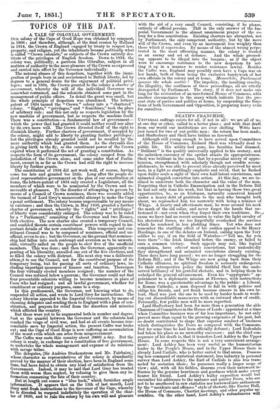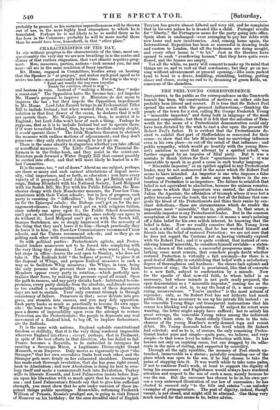DEATH'S FRANCHISE.
UrrivEns/a, suffrage exists for all, if not in all : we are all of us, at one day or other, called to a better place ; and with that draft from our world our institutions are ever shifting Writs have just issued for two of our public men ; the return has been made, and Shaftesbury and Sheil have bidden us farewell.
Although still young enough to have served upon Committees- of the House of Commons, Richard Shed was virtually dead to public life. His utility had gone, his faculties had dimmed. " Brilliant " is the quality universally applied to his oratory, and the unbroken currency of the epithet attests its appropriateness. Shed was brilliant in the sense, that by a peculiar mcety of appre- hension, strengthened with scholarly though not erudite accom- plishments, he was able to present ideas already perceived by most men, in a light so startlingly emphatic and vivid, that he flashed upon duller souls a sight of their own half-latent convictions, and animated sluggish conviction into action. At this day, we are in- clined to underrate both the character and the value of the man.
Forgetting that in Catholic Emancipation and in the Reform Bill, he had not only done his work, but that in having those two great opportunities, he, as an Irishman, naturally conceived himself under a heavy debt of gratitude to the men who brought both about, we reproached him too narrowly with being a retainer of Whigs. A hearty and affectionate man, he wore around his neck the mark of the old collar, and never forgot the hands that =- fastened it—not even when they forgot their own traditions. Be-,, cause we have had no recent occasion to value the light cavalry of his rhetorical forces, we too forgetfully overlooked the services which he rendered in less plodding times. Yet who does not remember the startling effect of his sudden appeal to Sir Henry Hardinge, in one of the debates on Ireland, calling upon the Tory soldier to say, if on the field of Waterloo—" Tell me, for you were there "—the Irish blenched before the enemy, or failed to earn a common victory. Such appeals may not, like logical compulsion, have altered men's convictions, but undoubtedly they strengthened and animated convictions already existing. Those days have long passed : we are no longer struggling for the Reform Bill ; and if the Whigs are now going back from their Catholic alliances, no spiritual freedom is seriously endangered. To their retrospective policy the faithful Sheil lent the unde- served brilliancy of his grateful rhetoric, and in helping them he unhelped the general advancement. Even his " appropriate " ap- pointment to a diplomatic mission at Florence, with instructions for Rome, was a questionable advantage to the public!: a Liberal, a Roman Catholic, a man disposed to fall in with policies and oblige his friends, and yet frank because sincere in his own in- tent, Sheil was just the one to be used by harder heads in work- ing out discreditable manceuvres with an outward show of credit. Personally, few public men will be more regretted.
Lord Shaftesbury, had been for more than a generation the able Chairman of Committees in the House of Lords : appointed at a time
when Committee business was of far less importance, he not only proved more than equal to the growing exigencies of his post, but no doubt contributed to shape that superior conduct of business which distinguishes the Peers as compared with the Commons. But for some time he had been officially defunct ; Lord Redesdale had taken his place as no unworthy successor ; and the chief con- sequence of his death is, that it transfers Lord Ashley to the Upper House. In some respects this is not a very convenient arrange- ment: Lord Ashley has been very useful as the humanitarian leader in the People's House, and in the Upper House there is already Lord Carlisle, who is better suited to that arena. Possess- ing less command of statistical statement, less industry in personal
survey than Lord Ashley, the Earl of Carlisle is also less tram- meled by sectarian ideas ; he possesses really a larger scope. of view; and, with all his foibles, disarms even their untoward in- fluence by the genuine heartiness and goodness which make every hearer his friend. Lord Ashley's bulky exposition would but encumber his addresses to the maturer and quieter Peers, who are not to be smothered in raw statistics nor harrowed into enthusiasm by the " accidents and offences " style of rhetoric, like Exeter Hall, the House of Commons, Chartist meetings, and other popular as- semblies. On the other hand, Lord Ashley's redundaneies will probably be pruned, as his sectarian superciliousnesswill be thrown out of use, in the more highly bred atmosphere to which he is translated. Perhaps he is not likely to be so useful there as he has been in the Commons ; probably he will be more useful there than he would have been, henceforth, in that "other place."



























 Previous page
Previous page